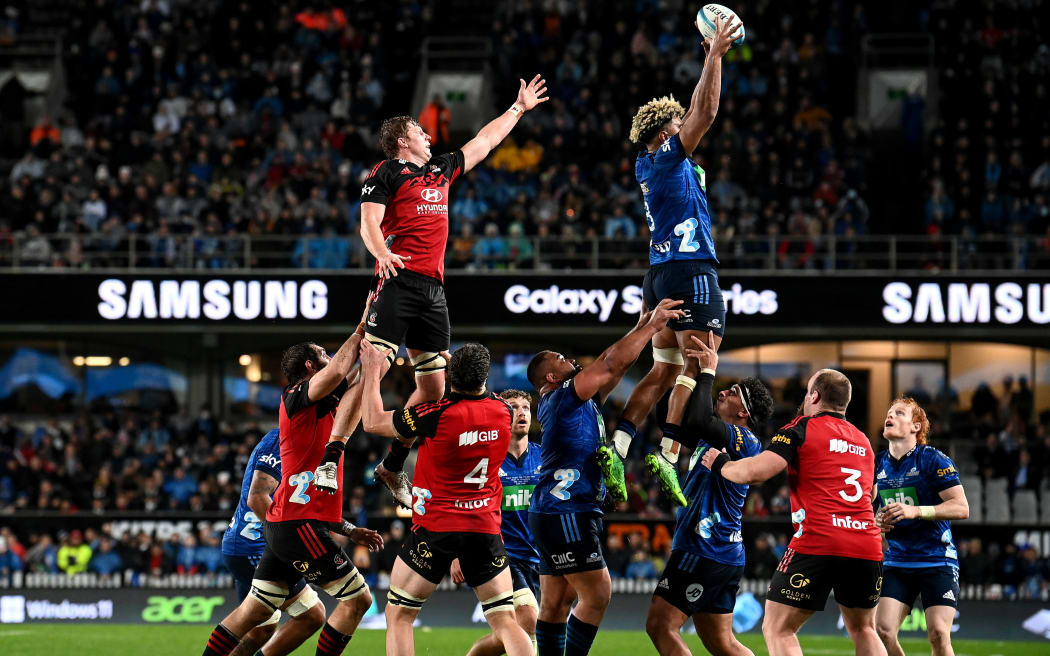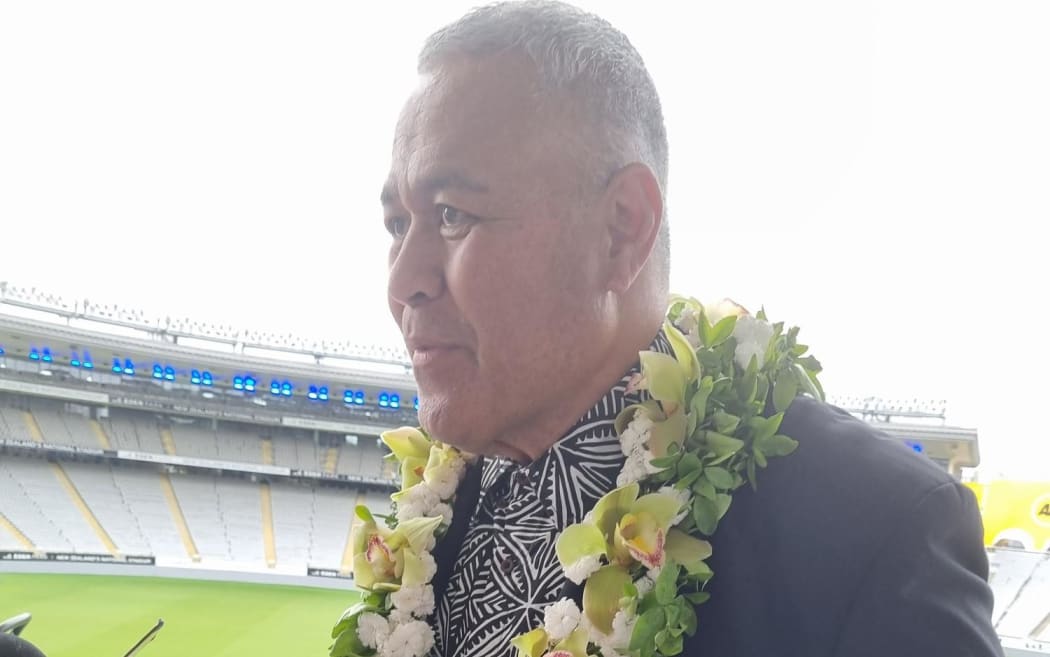
Hoskins Sotutu of the Blues wins the ball in the lineout. Photo: Photosport
A former Samoan American football player Manase Jesse Sapolu has called on New Zealand Rugby Union (NZRU) and the rugby world to recognise Pasifika players and give them their right dues.
Speaking as the chief guest at the launch of the New Zealand Rugby Pasifika Strategy 2024-2029 at the World Cup Lounge on Eden Park on Friday, Sapolu said their accomplishments need to be honoured.
"Our rugby story has a long history of success, that's longer and deeper than a Polynesian gridiron story we celebrate in America," he said to a room full of rugby officials and stakeholders.
"If we can make progress in America, a country of 330 million people, then there is no doubt that the accomplishments of our Pacific Island rugby players deserves to be honoured and recognised.
Sapolu played both center and offensive guard in a 15-year career for the San Francisco 49ers.
He said Pacific Island players contribution is still being under appreciated and that Pasifika players are not wanting any special treatment but just the right to have their stories heard and placed in the right place.

Manase Jesse Sapolu Photo: RNZ Pacific / Iliesa Tora
"It is without a doubt our Pacific Island players' contribution to rugby have been underappreciated," he said.
"We have a long line of rugby stars with great pedigree. Some of the very best players in the history of rugby have been Polynesians or Pacific Islanders.
"We are not asking for special favours or to be treated in a special way. We just ask or want our stories to be installed properly as part of the legacy here and around the world."
Sapolu told RNZ Pacific that it was time unions around the world compensated Pacific island players fully so that their families and communities can realise the benefits.
He said gridiron or American Football has taken notice of the talents Pacific island players have and now recognise the work being done by the Polynesian American Football group which he in involved in.
Pasifika focus - NZRU
Meanwhile, New Zealand Rugby said the new strategy will enable, embrace and empower positive outcomes and experiences for Pasifika at all levels of rugby in New Zealand.
The Strategy has been a work of partnership between the NZR, the NZR Pasifika Advisory Group and Moana Connect.
NZRU chairman Dame Patsy Reddy, said the strategy will help ensure that Pasifika players and rugby gets the desired outcomes both on and off the field.
"New Zealand Rugby Pasifika Strategy aims to enable, embrace and empower positive outcomes and experiences for Pasifika at all levels of rugby in New Zealand. We have touched on how Pasifika players have contributed on the field.
"And the need for both Pasifika and non-Pasifika players to learn to embrace each other both on and off the field."
She said Pasifika players make up the highest proportion of the All Blacks make-up.
The New Zealand Rugby Pasifika Strategy 2024-2029 states that 36 percent of contracted players in the Black Ferns or Black Ferns Sevens between 2021 and 2025 identify as Pasifika players.
For the All Blacks and All Blacks Sevens, 38 percent of contracted players identify as Pasifika.
In the Super Rugby Aupiki competition for women, 30 percent of contracted players are from Pasifika origins while 26 percent of players in the Super Rugby Pacific New Zealand teams are Pasifika players.
Dame Patsy acknowledged Pasifika rugby players in New Zealand and their contributions at all levels.
"There's a long legacy of Pasifika involved in rugby in Aotearoa New Zealand," she said.
"From grassroots right through to the elite level. The story of rugby in New Zealand has always included Pasifika, that make the game better at every level around the country."
A wide section of the Pasifika rugby community here in New Zealand attended the launch at the World Cup Lounge at Eden Park.

Panelist at a discussion included Sir Bryan Williams (second from right) and moderator Eroni Clarke (right). Photo: RNZ Pacific / Iliesa Tora
Why the strategy
Former All Black and a key member of the Tausoa Fa'atasi Pasifika Advisory Group Saveatama Eroni Clarke said the Pasifika Strategy was critical and important for the development of Pasifika rugby in a lot of ways.
He said there was consultation held to see what was important and what needed to be done.
"We looked at what is important for Pacific people. We looked at some areas we're not featuring," he said.
"Areas such as Pacific people in leadership, there's a lack of our people in terms of leadership. There's a lack of having our voice in rugby as well.
"What do we need to strategise. What do we need to create. What do we need as Pacific people to create to help us to create more where our Pacific people, our athletes and their families can flourish in rugby, particularly in Aotearoa."
He said the strategy should help develop more people who can take on the challenges of being in management and decision making positions within rugby in New Zealand, which he hopes, can translate across the Pacific region to hone unions in Fiji, Samoa, Tonga and the other rugby playing countries.
Clarke, whose son Caleb plays for the Blues of Auckland and the All Blacks, said Pacific unions can take the strategy and revise it to suit their needs.
"This strategy is critical for us as Pasifika," he said.
"The fact that more Pasifika players are now playing for other teams like England, Scotland, Italy and Japan means that these unions will also need to ensure strategies that can help players and their families."
Clarke added that the strategy is for five years and a good start that could be developed in the years ahead.

